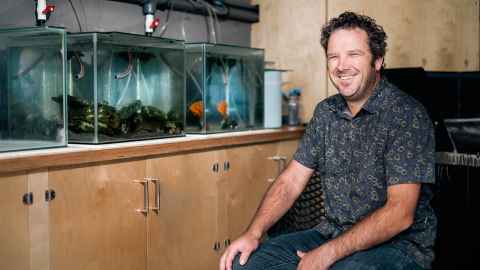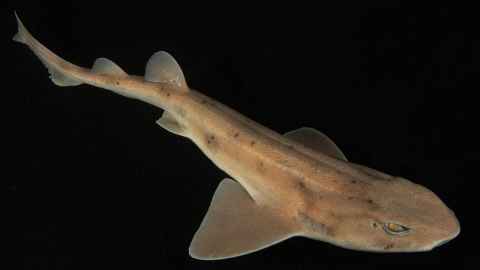Sharks can sleep with eyes wide open, research shows
10 March 2022
What happens when sharks sleep? A new study gives the first physiological evidence.

It was a world-first study from the Hauraki Gulf that made waves around the globe: research into the physiology of sharks' sleep.
Turns out, if you want to know whether a draughtsboard or "carpet" shark (Cephaloscyllium isabellum) is asleep, you should look at the creature's posture rather than its eyes, since this shark can sleep with eyes wide open.
Dr Craig Radford, of the University of Auckland, was part of the team of New Zealand and Australian scientists who monitored seven sharks to investigate, when were the sharks sleeping and how was it evident?
The sharks were in a specially-built tank equipped to measure their oxygen intake as an indicator of metabolism.
Sleep was associated with lying flat and a lowered metabolic rate, the scientists reported in the journal Biology Letters. (The carpet shark can stay stationary, resting on the sea floor, unlike some sharks which must swim constantly to stay alive.)
"Sharks represent the earliest group of jawed vertebrates and as such, they may provide original insight for understanding the evolution of sleep in more derived animals," the scientists wrote. "Unfortunately... very little is known about sleep in these ancient predators. As such, recordings of physiological indicators of sleep in sharks have never been reported."
What function does sleep serve for sharks? As with other animals, the scientists suspect it's all to do with conserving energy.
The findings were picked up around the world, from the New York Times to Nature.
"Sleep has been found in all animals studied to date, stretching as far back on the evolutionary scale as flatworms and jellyfish," one of the scientists, Dr Michael Kelly, of Simon Fraser University, wrote in The Conversation.
"As the earliest living, jawed vertebrates, sharks play an important role in helping us understanding the evolutionary history of sleep in vertebrates," he said. "Our research has come a long way in uncovering the previously unanswered question of sleep in sharks, but we have only touched the tip of the iceberg."

Media contact
Paul Panckhurst | media adviser
M: 022 032 8475
E: paul.panckhurst@auckland.ac.nz